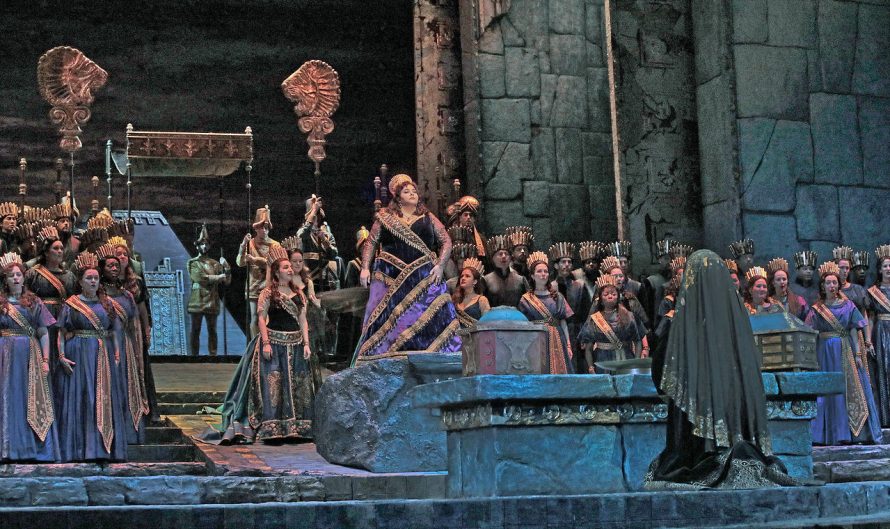
Semiramide is a challenging work. It is Gioachino Rossini’s last opera in Italian, in 1823, after which he moved in a new direction — towards the French grand opera William Tell which would be his last stage composition in 1829.
Rossini had put behind his frothy comedies with their rippling melodies and in Semiramide was presenting a serious and deeply explorative work. His earlier style involved less attention to the orchestra. Now his instrumentation is weightier, with dramatic power. The duets, ensemble scenes and choruses have nobility and distinction.
The Metropolitan produced this opera in the 1890s and not again until 1990. It certainly is worth doing when distinguished voices are available, as they are here. Semiramide will be telecast live in movie theaters worldwide on Saturday, March 10.
The best things in this revival are Angela Meade in the dramatic coloratura title role and Elizabeth DeShong in the mezzo-soprano part of her antagonist, Arsace. Unknown to either of them, they are mother and son. Semiramide, the queen of Babylonia, conspired with her lover Assur to murder her husband, King Nino, fifteen years earlier. Everyone assumed that Semiramide’s young son perished at the same time. Now Arsace returns and the queen wants to marry him. Hamlet and Oedipus are seemingly combined.
Meade’s rich and powerful tones suit the haughty queen. Her thrilling projection is even stronger than earlier in her career, firm and rounded from top to bottom, and she dominates the stage. She sings a thrilling high E above high C (not in the score, but traditional) near the end of her Act I aria, “Bel raggio lusinghier” (“A beautiful ray of hope.”)
DeShong has a smaller sized voice and is petite, which suits her character’s young age. Yet her voice is warm, agile and homogeneous, and she is a perfect musical partner in her duets with Meade. DeShong lacks the gutsy chest tones of Marilyn Horne, who was at the center of this Met production in 1990, but her voice has a distinctive attractiveness of its own that makes her a new star.
Javier Camarena is stylish as the Indian prince Idreno. The Mexican tenor has a brilliant top but there were some awkward disjoints when he descended the staff. And at the March 6 performance he cracked on the high D at the end of his big aria. I expect he’ll be rested, and better, on the March 10 HD telecast.
The bass Ryan Speedo Green is fine as the high priest Oroe, the only person who knows Arsace’s true identity. Russian bass Ildar Abdrazakov looks good as the villainous Assur, tall and menacing, but he fudges many of his coloratura ornamentations. Curtis alumna Sara Shafer is sweet of sound and appearance in the brief role of Azema.
The chorus under the direction of Donald Palumbo sounds superb but looks awkward as it clumsily marches on and marches off. The stage direction, costumes and faux-MIddle Eastern scenery look like tattered relics from Rossini’s century.
This landmark opera deserves stronger musical direction than it receives from Maurizio Benini. The overture is one of the best in all of opera, beginning in a whisper and building in volume and emotion. Here it was rushed, with inadequate inflection.